- Facebook Marketplace has become the dominant classifieds location in South Africa.
- ESET South Africa has identified six common scams that people fall for.
- The software security company also provides steps to spot these scams.
Over the past few years Facebook Marketplace has become the de facto place for buying and selling second hand goods after the closure of OLX locally and the diminishment of other platforms like Gumtree and Junk Mail.
This position at the top, however, comes with the downside of scams and bad actors on the platform.
Thankfully there is help from the professionals here as ESET South Africa, an IT security company, has identified six common types of scams and how to identify and avoid them.
According to ESET CEO Carey van Vlaanderen, these six scams are: the sale of defective items that appear functional, fake items designed as the real thing, overpayment, non-delivery, fake giveaways / phishing (the theft of personal information) and the classic bait-and-switch.
All of these types of scams are relatively self-explanatory as they have existed for the longest times both in person and online. The overpayment scam, however, is worth a bit of extra explanation as we see this one popping up a lot online with scam callers and fake emails.
“Sellers can also get scammed by fraudsters on Facebook Marketplace. In one classic example, fraudsters could claim to have overpaid for an item you’re selling and send a screenshot showing the alleged transaction. They’ll ask for the difference to be refunded. But of course, there was no original payment, and if you comply with their request, you’ll be out of pocket,” van Vlaanderen highlights.
We’d also like to add another warning here on top of those from ESET and van Vlaanderen: the sale of stolen goods, especially electronics. We’ve spent a long time on Facebook Marketplace and have had a lot of great experiences with it, but the electronics section of it is a minefield.
This is because stolen goods can be sold to unsuspecting buyers, only for them to be shut down remotely through software. This isn’t even mentioning the legal ramifications for being in the possession of an item that is reported stolen.
So with these types of scams in mind, what can shoppers do to stay safe? A list of general tips is provided and can be read below:
- “Inspect items before purchasing by only buying from local sellers in your area.
- Always meet in a public place rather than at your home, ideally during daylight hours.
- Check buyer / seller profiles for user ratings and reviews and be cautious if the profile was only recently created.
- Check the original price of items and if there is a significant difference between the usual price and the sale price, be aware that it may be counterfeit/stolen/defective, etc.
- Beware of giveaway deals and never enter your personal details to access them.
- Only use trusted payment methods via Facebook Messenger (PayPal, Facebook Checkout) as they offer a way to dispute payment. Gift cards, EFTs and services like eWallet and Instant Pay are commonly requested by fraudsters.
- Keep your conversation on Facebook – scammers like to move the conversation to another platform where it’s easier to swindle people and prevent them from disputing transactions.
- Never ship items before payment has been made and the money is reflecting in your account. Check your account to verify that the payment has been cleared. Do not accept an emailed ‘proof of payment’ as these can be fraudulently generated.
- Do not send two-factor authorisation codes to prospective buyers. Under no circumstances should you ever share these types of codes.”
One more point worth considering is groups on Facebook. The social media platform has a weird setup where sales posts can be shared / crossposted from groups to the Marketplace, which creates a bit of a confusing jumble of what is on the Marketplace and what is in a group.
We bring this up as closed groups with active moderators and a trusted community are usually the safest places to buy from as scammers, time wasters and other unwanted users are usually booted from the group.
This does require extra effort to find suitable groups, be accepted into them and then participate to become familiar with the rules, but it is usually worth it for the added peace of mind when selling or buying.

